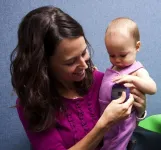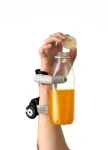(Press-News.org) Researchers at the University of Notre Dame are developing artificial intelligence tools that help consumers understand how they are being exploited as they navigate online platforms. The goal is to boost the digital literacy of end users so they can better control how they interact with these websites.
In a recent study, participants were invited to experiment with online privacy settings without consequence. To test how different data privacy settings work, the researchers created a Chrome browser plug-in called Privacy Sandbox that replaced participant data with personas generated by GPT-4, a large language model from OpenAI.
With Privacy Sandbox, participants could interact with different websites, such as social media platforms or news outlets. As they navigated to various sites, the browser plug-in applied AI-generated data, making it more obvious for participants to see how they were targeted based on their supposed age, race, location, income, household size and more.
“From a user perspective, allowing the platform’s access to private data may be appealing because you could get better content out of it, but once you turn it on, you cannot get that data back. Once you do, the site already knows where you live,” said Toby Li, assistant professor of computer science and engineering and a faculty affiliate at the Lucy Family Institute for Data & Society at Notre Dame, who led the research. “This is something that we wanted participants to understand, figure out whether the setting is worth it in a risk-free environment, and allow them to make informed decisions.”
Another study looked at dark patterns — or the design features on digital platforms that subtly nudge users to perform specific actions — and how they are used on websites to manipulate customers. For the study, Li and his team looked at how dark patterns are applied by interface designers to encourage people to consume more content or make impulsive purchasing decisions.
The researchers developed a Chrome browser plug-in dubbed Dark Pita to identify dark patterns on five popular online platforms: Amazon, YouTube, Netflix, Facebook and X.
Using machine learning, the plug-in would first notify study participants that a dark pattern was detected. It would then identify the threat susceptibility of the dark pattern and explain the impact of the dark pattern — financial loss, invasion of privacy or cognitive burden. Dark Pita would then give participants the option to “take action” by modifying the website code through an easy-to-use interface to change the deceptive design features of the site and explain the effect of the modification.
The researchers plan to eventually make both browser plug-ins, Privacy Sandbox and Dark Pita, available to the public. Li believes these tools are great examples of how the use of AI can be democratized for regular users to benefit society.
“Companies will increasingly use AI to their advantage, which will continue to widen the power gap between them and users. So with our research, we are exploring how we can give back power to the public by allowing them to use AI tools in their best interest against the existing oppressive algorithms. This ‘fight fire with fire’ approach should level the playing field a little bit,” Li said.
“An empathy-based sandbox approach to bridge the privacy gap among attitudes, goals, knowledge, and behaviors” was presented this month at the 2024 Association of Computing Machinery CHI Conference. Led by Li, fellow study co-authors include Chaoran Chen and Yanfang (Fanny) Ye from Notre Dame, Weijun Li from Zhejiang University, Wenxin Song at the Chinese University of Hong Kong and Yaxing Yao at Virginia Tech.
The study “From awareness to action: Exploring end-user empowerment interventions for dark patterns in UX,” led by Li, has been published in the Proceedings of the ACM on Human-Computer Interaction (CSCW 2024). Co-authors include Yuwen Lu from Notre Dame, Chao Zhang from Cornell University, Yuewen Yang from Cornell Tech and Yao from Virginia Tech.
This research was funded by a Google Research Scholar Award, a Google PSS Privacy Research Award and the National Science Foundation.
Contact: Brandi Wampler, associate director of media relations, 574-631-2632, brandiwampler@nd.edu
END
AI browser plug-ins to help consumers improve digital privacy literacy, combat manipulative design
2024-05-29
ELSE PRESS RELEASES FROM THIS DATE:
Grant funds CU project to develop novel mechanism to expand NF1 treatments
2024-05-29
The Gilbert Family Foundation has awarded data scientists in the Department of Biomedical Informatics (DBMI) at the University of Colorado School of Medicine $1.2 million to develop a microscopy assay and analysis pipeline for organoids derived from patients with Neurofibromatosis 1 (NF1), a complex rare disease that causes tumors to grow along nerves and produces a range of symptoms.
The project will help researchers develop more treatments for the disease, says DBMI assistant professor Gregory ...
A drying Salton Sea pollutes neighboring communities
2024-05-29
When desert winds stir up dust from the Salton Sea’s exposed lakebed, nearby communities suffer from increased air pollution. The deterioration coincides with reduced flows into California’s largest lake, a new research paper in the American Journal of Agricultural Economics finds.
Disadvantaged communities have been affected more than others in the areas near the Salton Sea, which has been shrinking for years, said the paper’s co-leading author Eric Edwards. He is an assistant professor of agricultural economics at University of California, Davis, who did the research while at North Carolina State University.
“We ...
Wild megalopolis: Study shows unexpected pockets of biodiversity pepper Los Angeles
2024-05-29
UCLA biologists have some good news and some bad news for lovers of urban wildlife in Los Angeles. The good news? Unexpected pockets of biodiversity pepper the city. The bad news? It will be a challenge to elevate the level of overall biodiversity of the city. Of all the major taxonomic groups studied, only snails and slugs are ‘easy’ to find in Los Angeles, probably because of the abundance of landscaping, gardens and irrigation.
The research points toward ways Angelenos — and people elsewhere — can make their city more hospitable not only to urban-tolerant species such as coyotes, but also to species that usually ...
Slugs and snails love the city, unlike other animals
2024-05-29
Most native species avoid more urbanized areas of Los Angeles, but slugs and snails may actually prefer these environments, according to a study publishing May 29 in the open-access journal PLOS ONE by Joseph Curti from the University of California, Los Angeles, and colleagues.
Urban areas continue to grow around the world, putting pressure on native species that find it difficult to tolerate the habitat changes and pollution it brings. To conserve and even increase biodiversity in cities, scientists and city planners need large-scale data on the ecological communities present, but this is time consuming and difficult to collect. Researchers used data from iNaturalist, a large ...
Ideas that cross international borders may have powerful impact on elections
2024-05-29
New simulations provide mathematical support for the theory that the spread of political ideas across international borders may have a big impact on election outcomes, and that small actions boosting a minority idea can gradually lead to global-scale political change. Jose Segovia-Martin and Óscar Rivero present these findings in the open-access journal PLOS ONE on May 29.
People in many regions around the world are increasingly exposed to international information—such as news and opinions shared via social media—allowing for the possibility of ...
YouTube’s comments section: Political echo chamber or constructive cross-partisan forum?
2024-05-29
The YouTube comments sections of politically neutral news outlets might be more conducive to cooperative, cross-partisan conversation than their liberal and conservative counterparts, according to a study published May 29, 2024 in the open-access journal PLOS ONE by Seung Woo Chae and Sung Hyun Lee from Indiana University. The study, which focused on the media response to the 2019 release of the Mueller report, found that more cross-partisan discussions took place on liberal channels than conservative ones and mainstream news outlets hosted more cross-partisan ...
Babies babble squeals and growls in clustering patterns observable from birth through the first year, suggesting this active vocal exploration is important to speech development
2024-05-29
In the first large-scale observation with human coding of infant vocalizations using all-day home recordings, babies of all ages from birth up to a year old squealed and growled in significant cluster patterns, suggesting the babies may have been actively engaged in noisemaking play and sound practice, according to a study published May 29, 2024 in the open-access journal PLOS ONE by Hyunjoo Yoo from the University of Alabama, Pumpki Lei Su from the University of Texas at Dallas, and colleagues.
In their first year of life, babies spend a remarkable amount of time vocalizing—both responding with noises to parents and caregivers, as well as self-directed babbling that could ...
The sweat bee, H. rubicundus, is less sociable in Scotland than in Cornwall, but is genetically differentiated and genetically isolated too
2024-05-29
The sweat bee, H. rubicundus, is less sociable in Scotland than in Cornwall, but is genetically differentiated and genetically isolated too
###
Article URL: https://journals.plos.org/plosone/article?id=10.1371/journal.pone.0302688
Article Title: Genetic differentiation at extreme latitudes in the socially plastic sweat bee Halictus rubicundus
Author Countries: Netherlands, UK
Funding: This work is part of a project that received funding from the European Research Council (ERC) under the European Horizon's 202 research and innovation programme (grantagreement no. 695744). RAB was funded by a Wageningen Graduate School Postdoctoral Talent fellowship and a BBSRC discovery ...
Smartphone use may help adolescents feel better - at least in the moment, finds real-time survey of US teens
2024-05-29
Smartphone use may help adolescents feel better - at least in the moment, finds real-time survey of US teens
###
Article URL: https://journals.plos.org/plosone/article?id=10.1371/journal.pone.0298422
Article Title: Real-world adolescent smartphone use is associated with improvements in mood: An ecological momentary assessment study
Author Countries: USA
Funding: This study used data from a larger project that was funded by a stand-alone research agreement between Facebook's Youth Research Fund (2018-2020, Facebook, Inc.) ...
Public have no difficulty getting to grips with an extra thumb, study finds
2024-05-29
Cambridge researchers have shown that members of the public have little trouble in learning very quickly how to use a third thumb – a controllable, prosthetic extra thumb – to pick up and manipulate objects.
The team tested the robotic device on a diverse range of participants, which they say is essential for ensuring new technologies are inclusive and can work for everyone.
An emerging area of future technology is motor augmentation – using motorised wearable devices such as exoskeletons or extra robotic body parts to advance our motor ...









